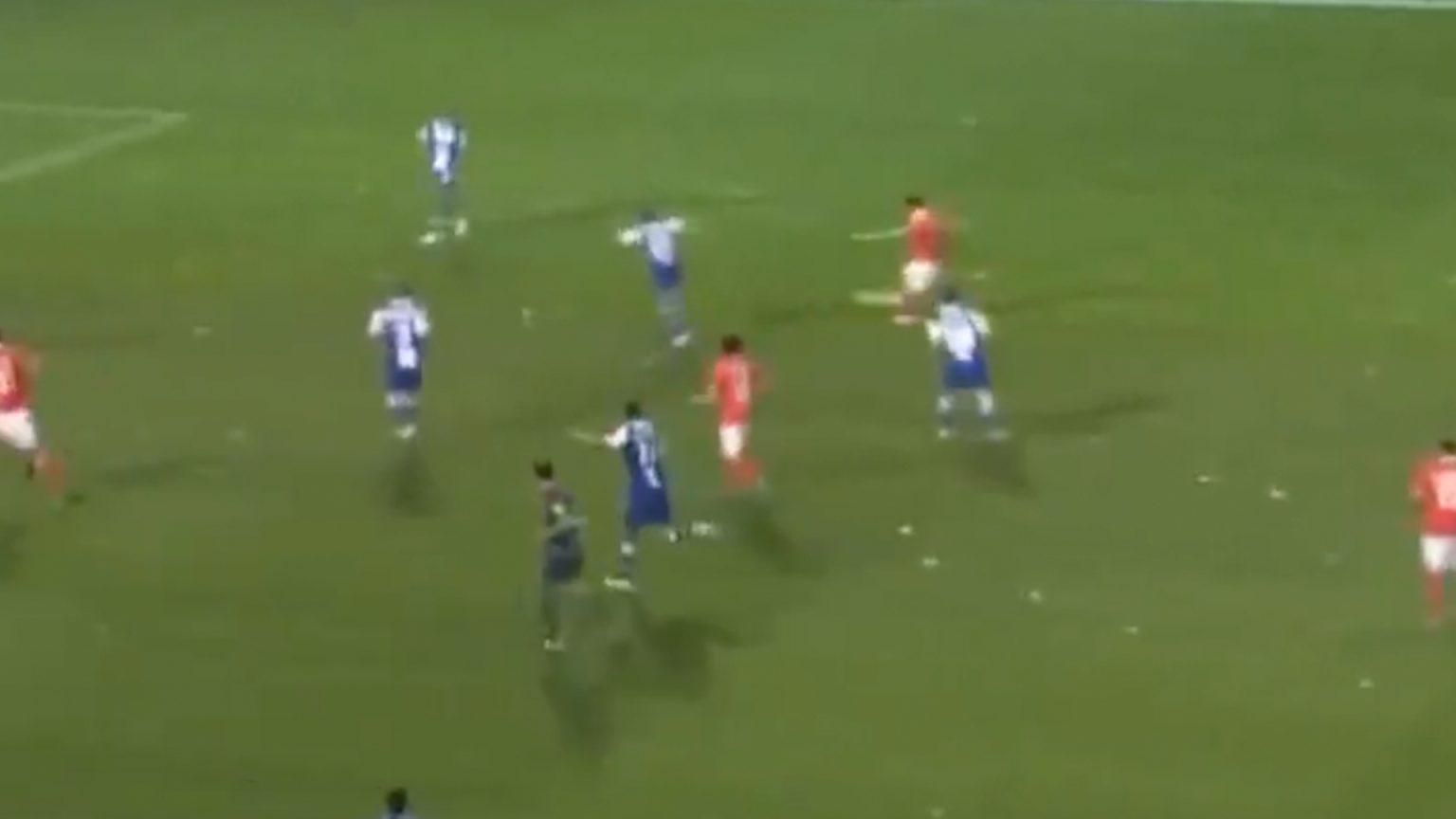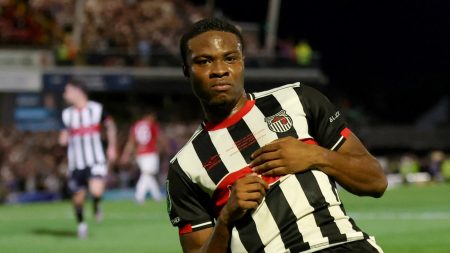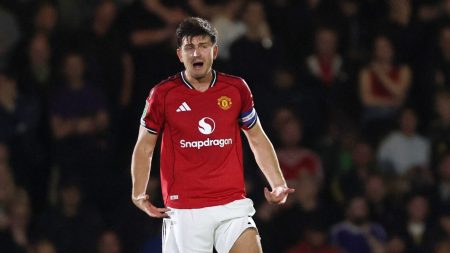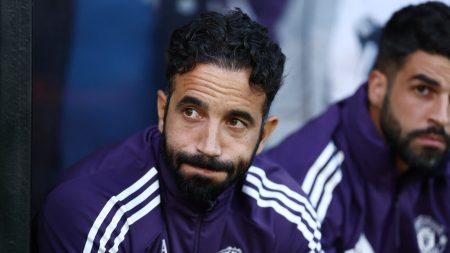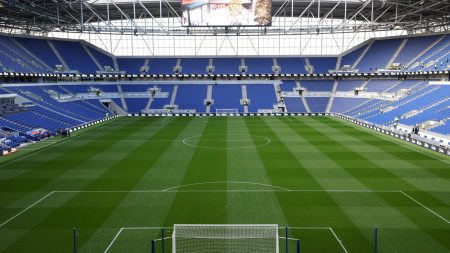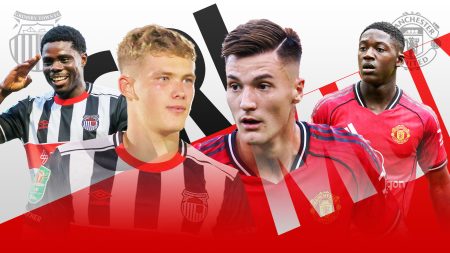Ruben Amorim tasted defeat for the first time as Manchester United manager, succumbing to a 2-0 loss against Arsenal at the Emirates. The match exposed vulnerabilities in United’s defense, particularly from set pieces, and a lack of attacking cohesion. Goalkeeper Andre Onana had a shaky performance, failing to command his area effectively, especially during Arsenal’s second goal, which stemmed from a set piece. While Onana escaped an early scare due to an offside call, his inability to deal with aerial threats proved costly. The defensive line, while showing promise in parts, struggled to contain Arsenal’s attacking prowess.
Diogo Dalot displayed some attacking intent, forcing a save from the Arsenal goalkeeper, but his defensive contributions were less impactful. Matthijs de Ligt and Harry Maguire formed a relatively solid partnership in the first half, but their inability to dominate in the air allowed Arsenal to capitalize on set pieces. Maguire, in particular, had a surprisingly good first half, showcasing solidity and composure. Noussair Mazraoui, deployed as a left-sided center-back, demonstrated his versatility, but his performance suggested he is more suited to a wing-back role.
Tyrell Malacia endured a torrid first half, struggling physically against Bukayo Saka and offering little offensively. His link-up play with Alejandro Garnacho was practically non-existent, leading to his half-time substitution. Manuel Ugarte, booked in the first half, failed to impose himself on the game, struggling both defensively and in possession. He did, however, make a crucial goal-line clearance to prevent Arsenal from extending their lead.
Bruno Fernandes, typically a driving force for United, was unable to exert his usual influence. Deployed in a deeper role alongside Ugarte, his attacking spark was noticeably absent. Mason Mount, operating on the right wing, proved ineffective, often lost in the half-space and contributing little to United’s attacking efforts. Garnacho, similarly, had a quiet game, offering little threat before being replaced in the second half. Rasmus Hojlund, despite battling gamely against William Saliba, was starved of service and cut a frustrated figure.
The substitutions made by Amorim failed to provide the desired impact. Amad, while offering more directness than Malacia, couldn’t change the course of the match. Marcus Rashford, typically a potent threat against Arsenal, was unable to produce his usual magic. Joshua Zirkzee, following an impressive previous performance, was anonymous in this game. Youngster Leny Yoro, brought on for Maguire, showed promise despite the challenging circumstances. Antony had a late chance from a free-kick routine but failed to convert.
Overall, the defeat highlighted key areas for improvement for Amorim’s United. The defense, particularly from set pieces, needs significant attention. The midfield lacked control and creativity, failing to provide adequate service to the forwards. The attacking players, usually vibrant and dynamic, were largely subdued. This defeat serves as a stark reminder of the work ahead for Amorim as he looks to mold this United side into a title-challenging force. The inability to create chances, even for a proven goalscorer like Hojlund, underscores the need for more creative solutions in the midfield. The experimentation with Mount on the right wing proved unsuccessful, highlighting the need for tactical adjustments.
The defensive frailties exposed by Arsenal’s goals, especially the second from a set piece, will be a cause for concern for Amorim. Onana’s hesitancy in commanding his area and the defenders’ inability to deal with aerial threats must be addressed. While Maguire had a surprisingly decent first half, the collective defensive performance was ultimately underwhelming. The midfield battle was lost, with neither Ugarte nor Fernandes able to dictate the tempo or create opportunities. This lack of control in midfield allowed Arsenal to dominate possession and stifle United’s attacking attempts.
The substitutions made by Amorim, while injecting some fresh energy, failed to alter the outcome of the match. Amad provided more directness than Malacia but lacked the end product. Rashford, typically electric against Arsenal, was kept quiet by the Gunners’ defense. Zirkzee, after a promising previous outing, failed to make an impact. Yoro, despite being thrown into a difficult situation, acquitted himself well and showed glimpses of his potential. Antony’s late chance, which he squandered, summed up United’s frustrating night.
Amorim’s first defeat as United manager will undoubtedly be a learning experience. The weaknesses exposed in this match, particularly the defensive vulnerabilities from set pieces, the lack of midfield control, and the subdued attacking performance, must be addressed. The tactical experiment with Mount on the right wing proved ineffective and requires reconsideration. The inability to create chances for Hojlund, despite his evident talent, highlights the need for more creativity in midfield and better link-up play between the midfield and attack. This defeat serves as a wake-up call for United and a reminder of the challenges ahead in their quest for silverware. The performance of individuals like Malacia and Mount will be of particular concern to Amorim, as will the overall lack of cohesion and attacking threat. The coming weeks will be crucial for Amorim to address these issues and ensure this defeat serves as a catalyst for improvement.





